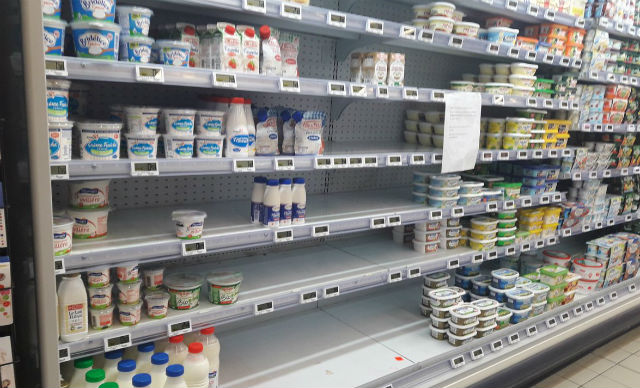The consequences of France running out of butter could be pretty catastrophic. For a start you might have to bid adieu to your morning croissant or pain au chocolat.
Although we are'nt there yet, France is suffering from a shortage of butter and we can’t say we haven’t been warned because those in the dairy industry have been doing just that for months.
According to a report in Le Monde newspaper on Friday the shortage is due in part to a huge increase in demand for butter throughout the developing world as well as the growing appetite for French pastries like croissants, notably in China.
Alors là.. carrément plus de #beurre …. rayon complètement vide #Bretagne “SOS pour les bretons sans beurre” #pénurie #lait @ReseauFnpl pic.twitter.com/AeQ3ttTJ1j
— marie andree luherne (@MaLuherne56) October 19, 2017
Hé #Macron, voilà ce qui arrive lorsque ton #UE s'occupe de quelque chose!
#beurre #pénurie #bordel pic.twitter.com/Ym3ojfRXoh— fabricerestier ☨ (@fabricerestier) October 6, 2017
La classe…etre en normandie est etre en penurie de beurre….?? pic.twitter.com/vyKZYqUCve
— indololotte (@Indololotte) October 19, 2017
Ça y est. Le ciel est jaune en Bretagne UNE journée et y'a déjà plus de beurre salé. On voit ce qui est important pour la fin du monde. pic.twitter.com/1O3RlFJWKF
— ? Fangh ☠ (@FanghGD) October 18, 2017
But even in France the rate of butter consumption has increased by five percent in recent years.
Have you noticed gaps in the refrigerated shelves of your supermarkets? It appears that only the most expensive brands of butter are now available in many supermarkets in France.
Brittany, Normandy, Franche-Comté and Centre-Val de Loire are particularly affected, reports say.
Some stores have been forced to put up the notice: “The butter market faces an unprecedented shortage of raw material which has led to shortages in stores.”
As The Local reported back in June, the price of butter has exploded in recent months. In 2016 the price of a ton of butter was €2,500 but by this summer it had reached €7,000.
That hike has not had much of an impact on the price of butter in supermarkets yet because the industry sets the price for big supermarkets on an annual basis.
Hugues Beyler, director of the Federation of Commerce and Distribution (FCD) said for the moment there are only “occasional shortages, often linked to problems of logistics” as well as the butter-loving French public panic buying and filling their shopping baskets with more blocks of “President” than usual.
And the knock on effect is that the price of your morning pastry is steadily going up, with many bakers having been forced to add 5 or 10 centimes on the price of a croissant.
France's federation of bakeries has called for the dairy industry to prioritise the production of butter as a way of battling the rise in prices.
READ ALSO:



 Please whitelist us to continue reading.
Please whitelist us to continue reading.